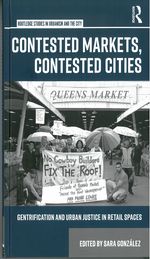 [EN] Contested Markets, Contested Cities is one of the very few works that looks at public markets from a perspective of contestation exploring their role in processes of gentrification but also in political mobilisation and urban justice. Markets are at the origin of urban life as places for social, cultural and economic encounter evolving over centuries. Today, they have a particular value as mostly independent, non-corporate and often informal work spaces serving millions of the most vulnerable communities across the world. At the same time, markets have become fashionable destinations for foodies and middle class consumers and tourists looking for authenticity and heritage. The confluence of these potentially contradictory actors and their interests turns markets into “contested spaces”. The book looks at markets from Mexico City, Santiago de Chile, Buenos Aires, Quito, London, Leeds, Madrid and Sofia.
[EN] Contested Markets, Contested Cities is one of the very few works that looks at public markets from a perspective of contestation exploring their role in processes of gentrification but also in political mobilisation and urban justice. Markets are at the origin of urban life as places for social, cultural and economic encounter evolving over centuries. Today, they have a particular value as mostly independent, non-corporate and often informal work spaces serving millions of the most vulnerable communities across the world. At the same time, markets have become fashionable destinations for foodies and middle class consumers and tourists looking for authenticity and heritage. The confluence of these potentially contradictory actors and their interests turns markets into “contested spaces”. The book looks at markets from Mexico City, Santiago de Chile, Buenos Aires, Quito, London, Leeds, Madrid and Sofia.
This work is the result of an international and collaborative research project funded by the EU called Contested Cities that brought together scholars from Europe and Latin America between 2012 and 2016.
In this page you can find the “authors’ versions” of the book originally published by Routledge with the exception of the conclusions chapter. We publish it here under a “green open access” policy. The author’s version is broadly the same as the published one although it may have minor typographical and bibliographical errors, and it lacks any images. The final published version can be purchased here.
If you want more information about the book and its broad topics you can get in touch with the editor Sara González. To find out more about specific markets/case studies get in touch with the authors of the chapters directly.
[ES] Contested Markets, Contested Cities es uno de los pocos trabajos que analiza los mercados públicos como espacios en disputa, explorando su papel en procesos de gentrificación, pero también en la movilización política y la justicia urbana. Los mercados son parte del origen de la vida urbana como lugares de encuentro social, cultural y económico y han evolucionado a lo largo de los siglos. Hoy en día, tienen un valor particular como espacios independientes, no corporativos y a menudo informales que sirven a millones de las comunidades más vulnerables de todo el mundo. Al mismo tiempo, los mercados se han convertido en destinos de moda para gourmets y consumidores de clase media y turistas que buscan experiencias auténticas. La confluencia de estos actores potencialmente contradictorios y sus intereses convierte a los mercados en “espacios en disputa”. El libro analiza mercados de la Ciudad de México, Santiago de Chile, Buenos Aires, Quito, Londres, Leeds, Madrid y Sofía.
Este trabajo es el resultado de un proyecto de investigación internacional y de colaboración financiado por la UE llamado Contested Cities que reunió a académicos de Europa y América Latina entre 2012 y 2016.
En esta página puedes encontrar las “versiones de los autores” del libro originalmente publicado por Routledge con la excepción del capítulo de conclusiones. Lo publicamos aquí con acceso abierto mediante la “vía verde”. La “versión del autor” es sustancialmente la misma que la publicada, aunque puede tener errores tipográficos y bibliográficos menores, y carece de imágenes. La versión final publicada se puede adquirir aquí.
Si deseas obtener más información sobre el libro y sus temas generales, puedes ponerte en contacto con la editora Sara González. Para obtener más información sobre mercados específicos / estudios de caso, ponte en contacto directamente con los autores de los capítulos.
0 INDICE/TABLE OF CONTENTS
1 Introduction: Studying markets as spaces of contestation. Sara González
2 Markets of La Merced: New frontiers of gentrification in the historic centre of Mexico City. Víctor Delgadillo
3 Learning from La Vega Central: Challenges to the survival of a publicly used (private) marketplace. Elke Schlack, Neil Turnbull, and María Jesús Arce Sánchez
4 Resisting gentrification in traditional public markets: Lessons from London. Sara González and Gloria Dawson
5 The contested public space of the tianguis street markets of Mexico City. Norma Angélica Gómez Méndez
6 Gourmet markets as a commercial gentrification model: The cases of Mexico City and Madrid. Luis Alberto Salinas Arreortua and Luz de Lourdes Cordero Gómez del Campo
7 Neighbourhoods and markets in Madrid: An uneven process of selective transformation. Eva García Pérez, Elvira Mateos Carmona, Vincenzo Maiello and Alejandro Rodríguez Sebastián
8 Mercado Bonpland and solidarity production networks in Buenos Aires, Argentina. Victoria Habermehl, Nela Lena Gallardo Araya and María Ximena Arqueros
9 Public markets: Spaces for sociability under threat? The case of Leeds’ Kirkgate Market. Penny Rivlin and Sara González
10 Contested identities and ethnicities in the marketplace: Sofia’s city centre between the East and the West of Europe. Stoyanka Andreeva Eneva
11 Popular culture and heritage in San Roque Market, Quito. Eduardo Kingman Garcés and Erika Bedón
Reseña sobre los contribuidores/Authors’ short biographies

 Creative Commons 2024 Contested Cities. Algunos derechos reservados. Todo el sitio, si no se especifica lo contrario, licenciado bajo
Creative Commons 2024 Contested Cities. Algunos derechos reservados. Todo el sitio, si no se especifica lo contrario, licenciado bajo